3 Cal Poly students are leading voting workshops for Spanish-speakers. Here’s how to join
Jonathan Gallardo, a Spanish-speaker and lifelong resident of Nipomo, has never voted before.
But after attending a LatinX Voter Empowerment Workshop in his hometown, Gallardo, 20, said he will be registering to vote for the first time this year.
The workshop was one of six organized in September by a group of Spanish-speaking Cal Poly students and the San Luis Obispo County Clerk-Recorder office to engage Hispanic voters across the county.
Around 15 Spanish-speaking attendees, students and county staff gathered in a room at the Nipomo Library on Sept. 11 to discuss local issues impacting their community.
People enjoyed homemade agua fresca and Mexican concha cookies donated by a local food vendor while the students presented in Spanish about the importance of voting, the officials that represent them, and how they can take action locally.
A county staff member handed out informational fliers in Spanish on how to register to vote in the upcoming election and polling hours and locations, along with an explainer of ballot propositions, giving attendees physical resources on civic engagement.
“It was a really cool experience to see our Latino community receive these important resources,” Gallardo told The Tribune in Spanish speaking through a translator. “I’m glad I went because I got the necessary information to make my voice heard.”
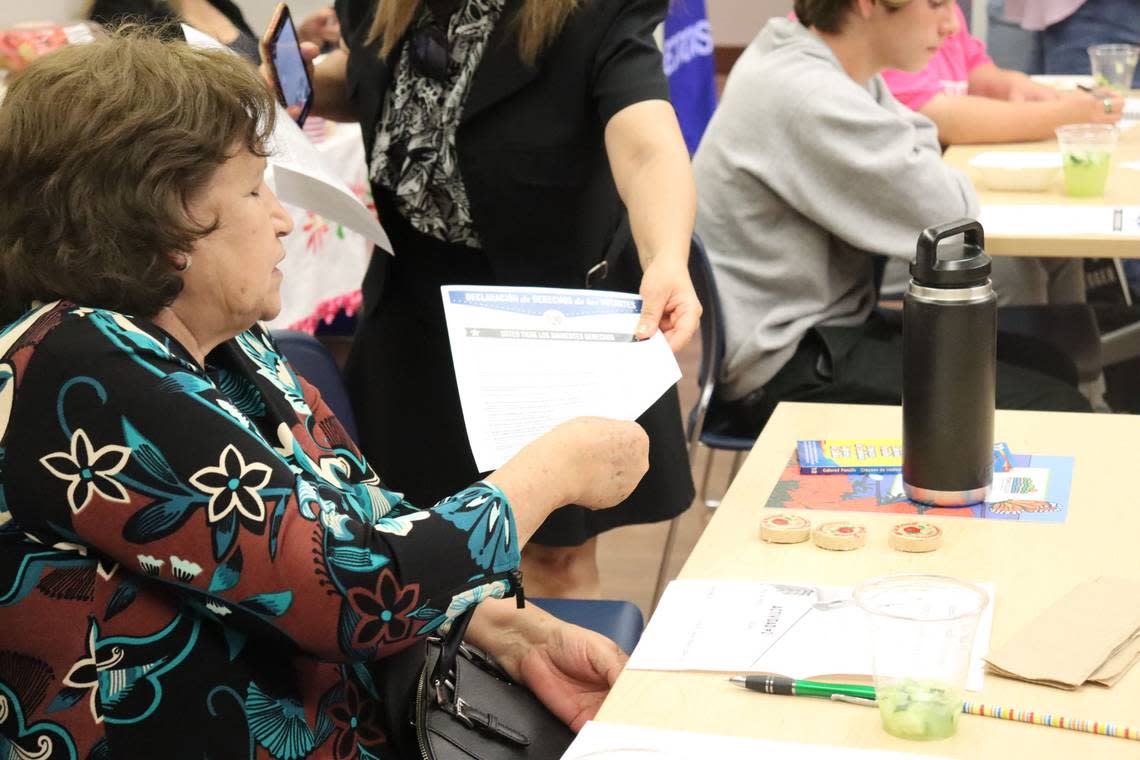
California’s Spanish-speaking voters are underrepresented and underserved, students say
Even though Spanish-speakers make up a huge portion of the eligible voter base in California, they are historically one of the least engaged voter groups in the state.
California is home to a quarter of the nation’s eligible Hispanic voters, but in 2020 the Latino population had the lowest registration rate of all voters in the state. According to a 2020 study by the Public Policy Institute of California, only 47% of adult Latino citizens in California were likely to vote compared to 65% of non-Hispanic white citizens statewide.
According to the Clerk-Recorder’s Office, only 1,328 SLO County voters listed Spanish as their preferred language on their voter registration in December 2023 out of 176,774 total registered voters in March.
Three Spanish-speaking Cal Poly seniors — Darius Rogness, Karina Saldivar and Alondra Cardoso — observed these trends happening in SLO County, where a quarter of the total population is Hispanic, and decided to do something about it.
With the support of two university faculty members, the county Clerk-Recorder’s Office, a small research grant and some willing community partners, they kick-started a countywide Spanish-speaking voter education and outreach initiative going into their senior year at Cal Poly.
“I’ve always seen that there’s been a need in my community,” said Rogness, 21, a first-generation college student whose family moved to Nipomo from Mexico when he was 8 years old. “Historically, our Latino community has been underrepresented. We now have the tools with our professors and Cal Poly support to actually plant those seeds, to start to build those initiatives, supporting and informing our Latino community.”
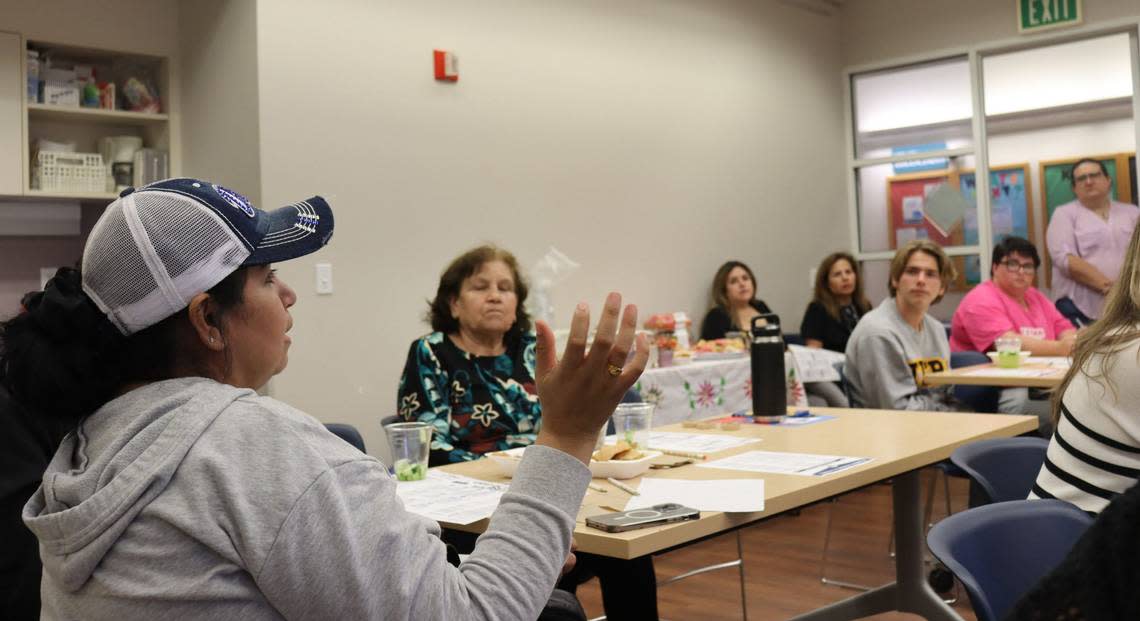
Their faculty advisers are Cal Poly professors Marion Hart and Victoria Zamora.
The project — supported by a $3,000 county community development grant applied for through the League of Women Voters — aims to bridge the information gap between the Latino community and the county Clerk-Recorder’s Office.
After initial conversations with the county, the students learned there were limited county resources for Spanish speakers, both in terms of printed materials and Spanish speakers working the polls on election day.
Their office of 22 has four bilingual staff members, only one of which is a full-time election worker, said Erin Clausen, public information officer for the Clerk-Recorder’s Office.
The three students spent the summer conducting research, meeting with community leaders and leading conversations with members of the Latino community in SLO County to better understand their needs as voters.
The result of their efforts? Six LatinX Voter Empowerment Workshops they have planned to be held at different locations across the county throughout September ahead of ballots being sent out on Oct. 7.
Two events have been held so far in Atascadero and Nipomo, and four more are planned over the coming weeks in San Miguel, Cambria, Oceano and San Luis Obispo.
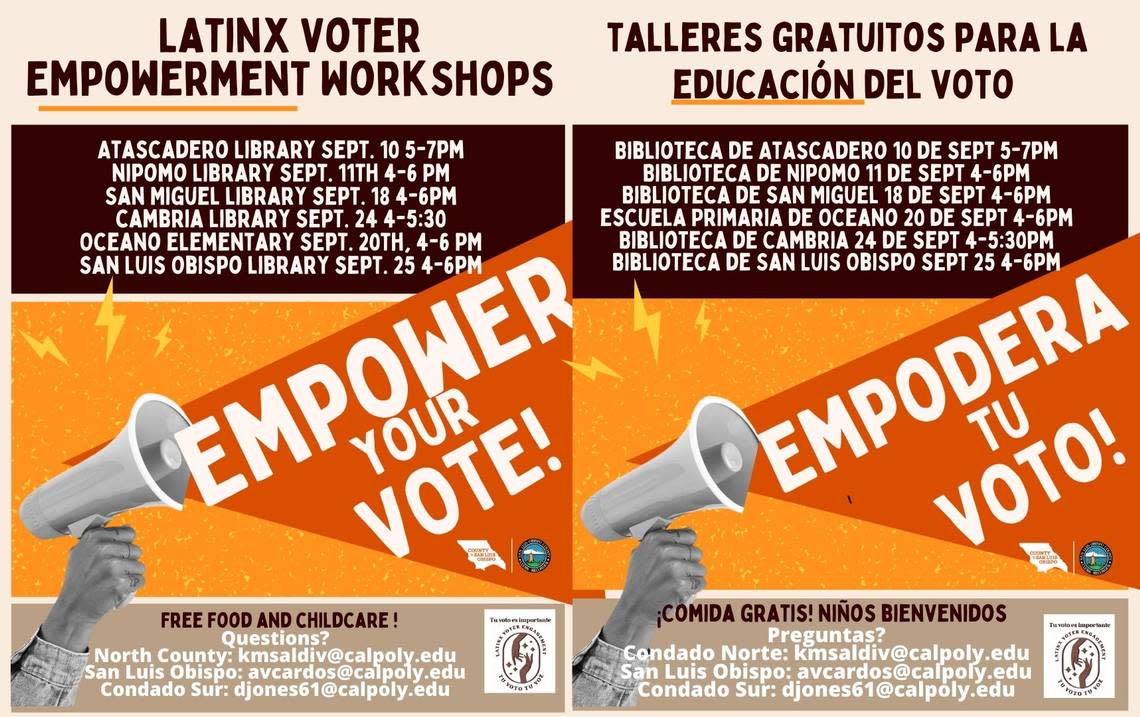
Andres Gonzalez, another attendee at the Nipomo workshop, said he has been a U.S. citizen for four years, but he will vote for the first time this November.
“I never really had the chance to vote,” Gonzalez said.
He has lived and worked in Nipomo since 1992 after immigrating to America from Ensenada, Mexico. He said between sometimes having multiple jobs and raising a family, many of SLO County’s Spanish-speaking citizens are not exposed to politics in their busy lives and candidates’ messaging — often exclusively in English — does not reach them.
“As a Mexican and Hispanic ... you never get to see who is running for anything, and because of that you care less about voting,” Gonzalez said. “You don’t know if the person that wins is the right one for your community ... but your vote makes a difference. My family’s vote makes a difference.”
Rogness said that there were at least three people at the Nipomo event that were born outside of the U.S. and we’re able to learn about how to engage civically while in the process of gaining citizenship. Two people signed up to volunteer as bilingual poll workers, he said.
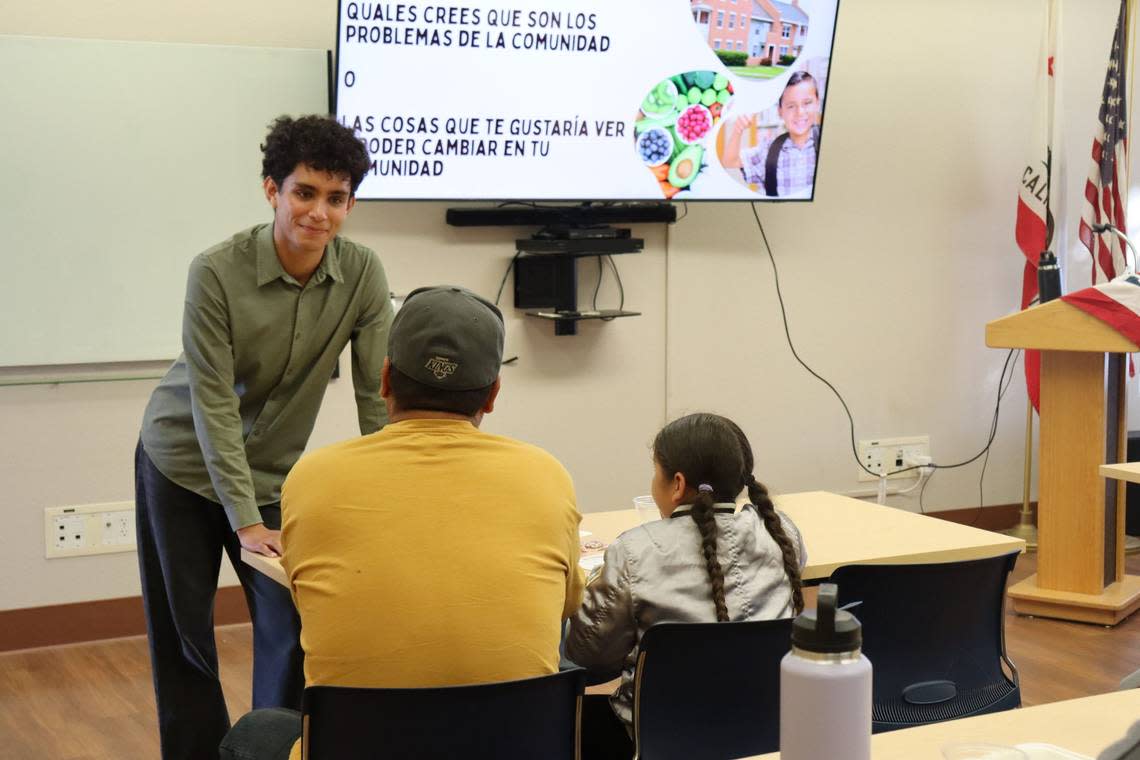
Growing up in Spanish-speaking homes, Rogness, Saldivar and Cardoso said they have all observed first-hand the critical information gap between political candidates and their Spanish-speaking constituents.
“We’ve noticed these disparities and these needs for such a long time,” Rogness said. “We grew up with them.”
Saldivar, 27, shared her insights of the obstacles that Mexican immigrants face upon gaining the right to vote as citizens.
“From what I’ve seen, it’s the fear initiative going into something that’s unknown,” she said. “I’ve noticed that a lot of the Hispanics who are able to vote, even if they had the opportunity to vote in Mexico, they didn’t do it. So coming to the U.S., coming to a place where (English) is their second language, it’s just kind of a dicey field for them.”
She said that by hosting in-person, step-by-step workshops showing Spanish-speaking voters what ballots look like and how to vote, they hope people will feel empowered to go into polling places on election day with confidence.
Ballots are also available in Spanish for those who choose to vote-by-mail.
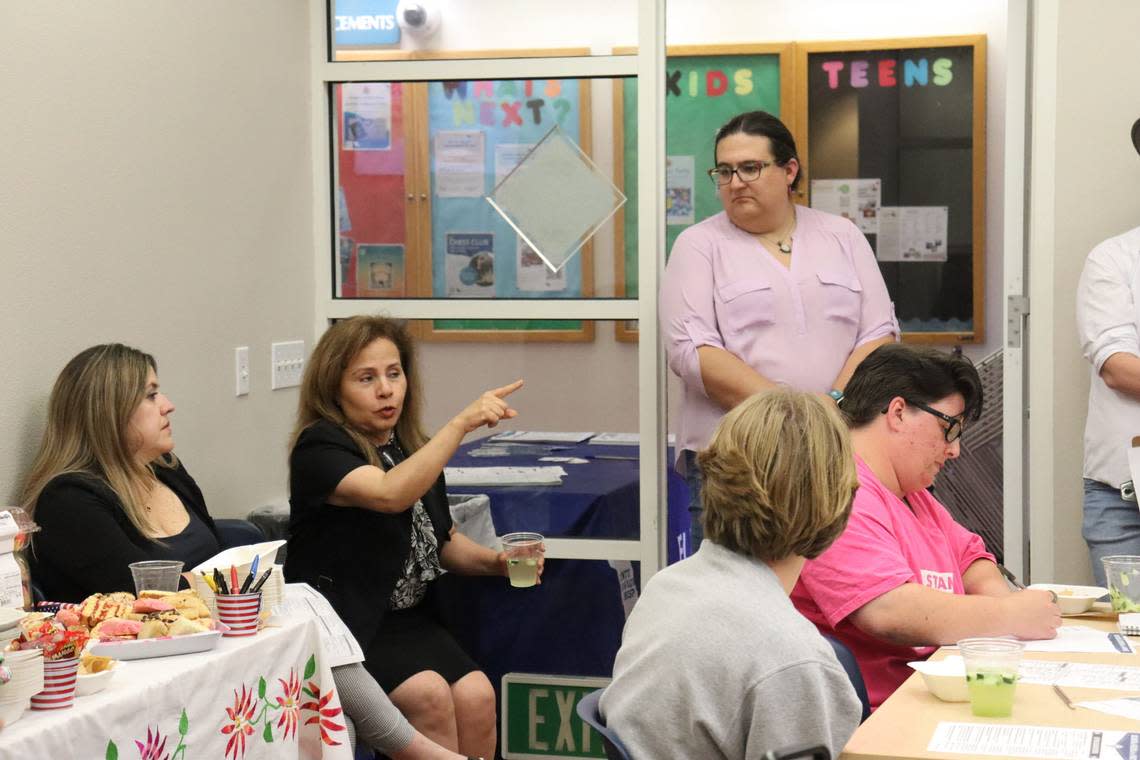
The students and their faculty advisers organized the events in collaboration with the Clerk-Recorder Office, which helped coordinate locations and bring out a Spanish-speaking staff member to share information about how to register and vote.
The team also partnered with community organizations like Mujeres de Acción, SLO Promotoras, Corazón Latino, 805 La Voz and the League of Women Voters to fund and promote the events.
Marion Hart, one of the two Cal Poly faculty advisers on the project, emphasized that the workshops are nonpartisan.
“We want to make sure that it’s super clear that we’re not telling people who to vote for,” Hart said. “This is merely a question of ... answering questions about the voting process, creating access and also drawing people into the resources that exist in the Clerk-Recorder’s Office.”
Clausen from the Clerk-Recorder’s Office said that the project has been a “gift” to the community and a major contribution to the county’s goal of increasing voter engagement.
“If every single eligible resident of our county was registered and went out to vote, that would be my dream,” Clausen said.
She said that to support this mission, an Atascadero voting office will open 29 days before the election with one bilingual staff member working on site, making it easier for North County residents to get voting information in-person without coming down to SLO.
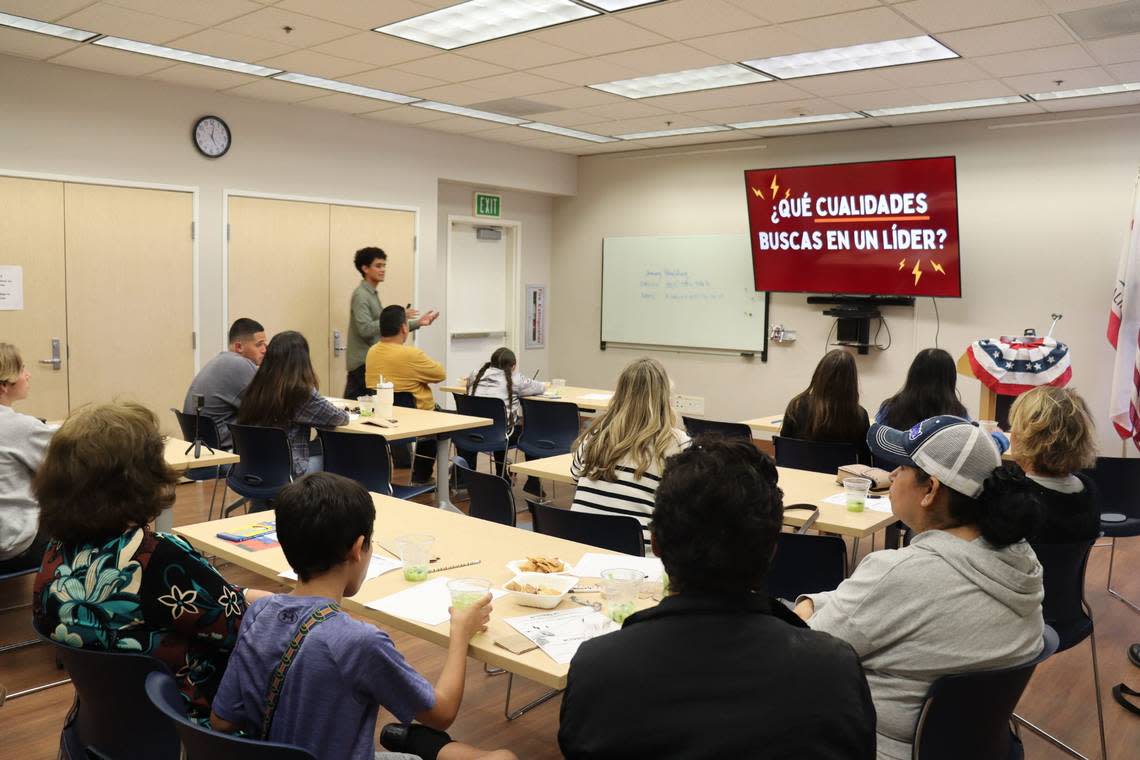
Looking to the future of voter engagement
The Clerk-Recorder’s Office also put out a call for bilingual workers to help at the polls on Election Day, providing in-person guidance for Spanish-speaking voters. The positions are paid.
In the last election in 2022, there were about 10 or 12 bilingual poll workers, Clausen said. The general election will have between 450 and 500 workers in total, she said.
“We want to make sure that if people who are wanting to vote and able to vote and are more comfortable speaking Spanish, that there are people in each of the polling stations, or as many as we possibly can, who are Spanish speakers and are able to write information and answer questions about the process in Spanish on Election Day,” said Hart, one of the students’ faculty advisers.
Those interested in becoming a poll worker or for more information on voting are encouraged to contact the Clerk-Recorder’s Office at www.slocounty.ca.gov/departments/clerk-recorder/contact-us#contactarea.
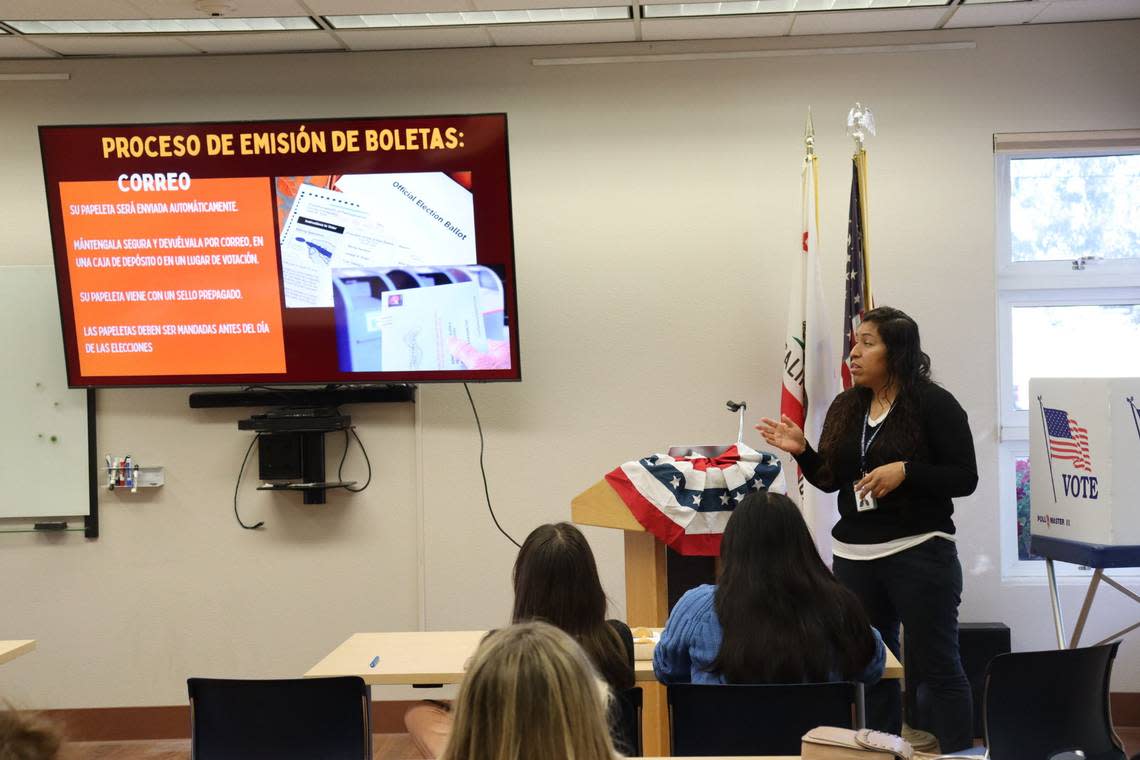
The students behind this initiative have big aspirations for the future, and this is hopefully just the start, they said.
“Something important about this project is this is one of the first times there really is this bridge, an initiative to collaborate with the Clerk-Recorder’s Office and having accessible voter information workshops for the Latino community,” Rogness said. “In that way, we’re just so excited to be planting the seed.”
One day, they hope to expand their work across the state, and maybe even farther.
“We’re planting seeds, not only for our generation, but for our people,” Cardoso said. “There’s a huge need, and we are able to address it here, but there’s so many other places where it needs to also happen. If we continue to do this and continue to expand, who knows who we can reach?”






